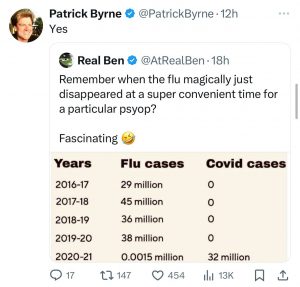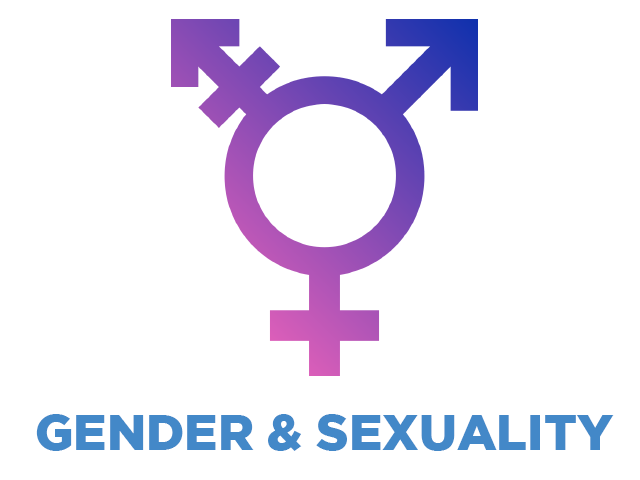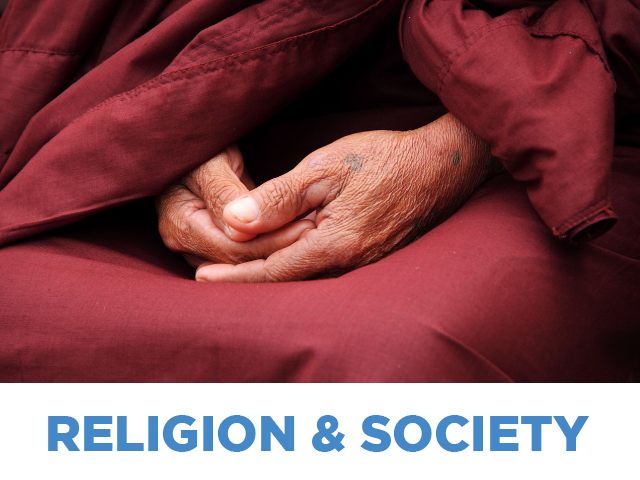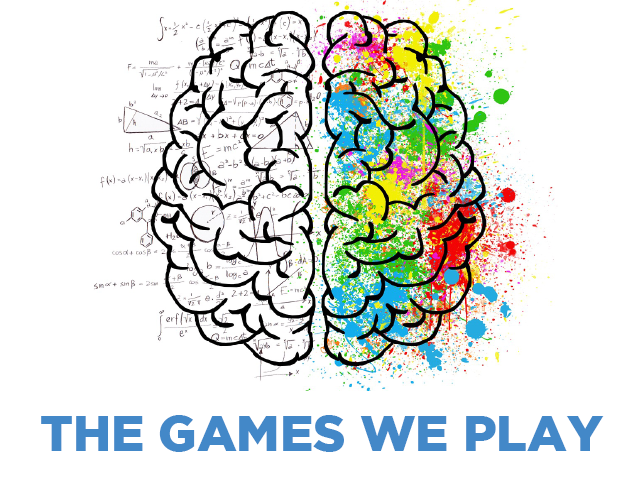
VAERS data shows Moderna causes 30% more deaths per dose than Pfizer
I've known since 2021 that Moderna was more deadly on a per shot basis than Pfizer. Here's what the VAERS data shows. I'm going to show you on Tuesday that VAERS got it right.
We FINALLY have the gold-standard official state government data that proves the mRNA vaccines increased all-cause mortality. The younger were disproportionately affected. So many children were killed due to the negligence of the FDA and CDC who refuse to look at the safety evidence like the Czech Republic data.
Executive summary
In this article, I want to prove to you that Moderna generates 30% more death reports in VAERS than Pfizer.
There is no way you can explain this other than the Moderna shots were more deadly than the Pfizer shots.
This is very important because in my next article, I’m going to show you gold-standard evidence that the VAERS data was the canary in the coal mine that everyone in mainstream medicine chose to ignore.
Outline of this article
- Show the ratio of doses between Pfizer and Moderna delivered in the US
- Show the ratio of death reports in VAERS associated with Pfizer vs. Modern
- Divide 1 by 2.
- Answer: 1.3 (30% higher deaths per dose)
This isn’t rocket science.
Introduction
Very early in the pandemic, before I wrote my first Substack article, I was writing documents analyzing the VAERS data like this one.
As part of the research for that article, I did VAERS queries that showed on a per shot basis that Moderna killed around 50% more people than Pfizer. And J&J was even worse than Moderna.
I’m going to show you here that my original calculations still hold up by trying to recreate my original work (because I can’t find the original calculations).
The reason this is so important is that now, using a new technique (comparing ACM rates of the different vaccine brands that were distributed to the Czech Republic population based on availability), I can now prove beyond any reasonable doubt that the COVID vaccines caused unacceptable increases in all-cause mortality for those who opted for the shots.
But first, I want to show you that the VAERS data clearly shows that the Moderna vaccine causes a disproportionately higher number of deaths than Pfizer.
This has been known since the very start of the pandemic, but the medical community chose to ignore it.
Moderna has disproportionately higher deaths reports in VAERS from the shots
The propensity to report a death in VAERS is independent of vaccine brand.
So if you have a disproportionately higher mortality rate, it’s nearly a certainty that your vaccine has to be unsafe.
It turns out that Pfizer has 57% more doses than Moderna, but it only has 21% more deaths. The only way that can happen is if Moderna has a 30% higher death rate than Pfizer.
Even if Pfizer is a completely safe vaccine, Moderna is a disaster.
The fact nobody is pulling the plug on Moderna is INSANE.
Not a single country will look at their own safety data. If they did, they could quickly validate this. I’ll even supply the source code. For free!
Here’s the rollout data for Pfizer vs. Moderna
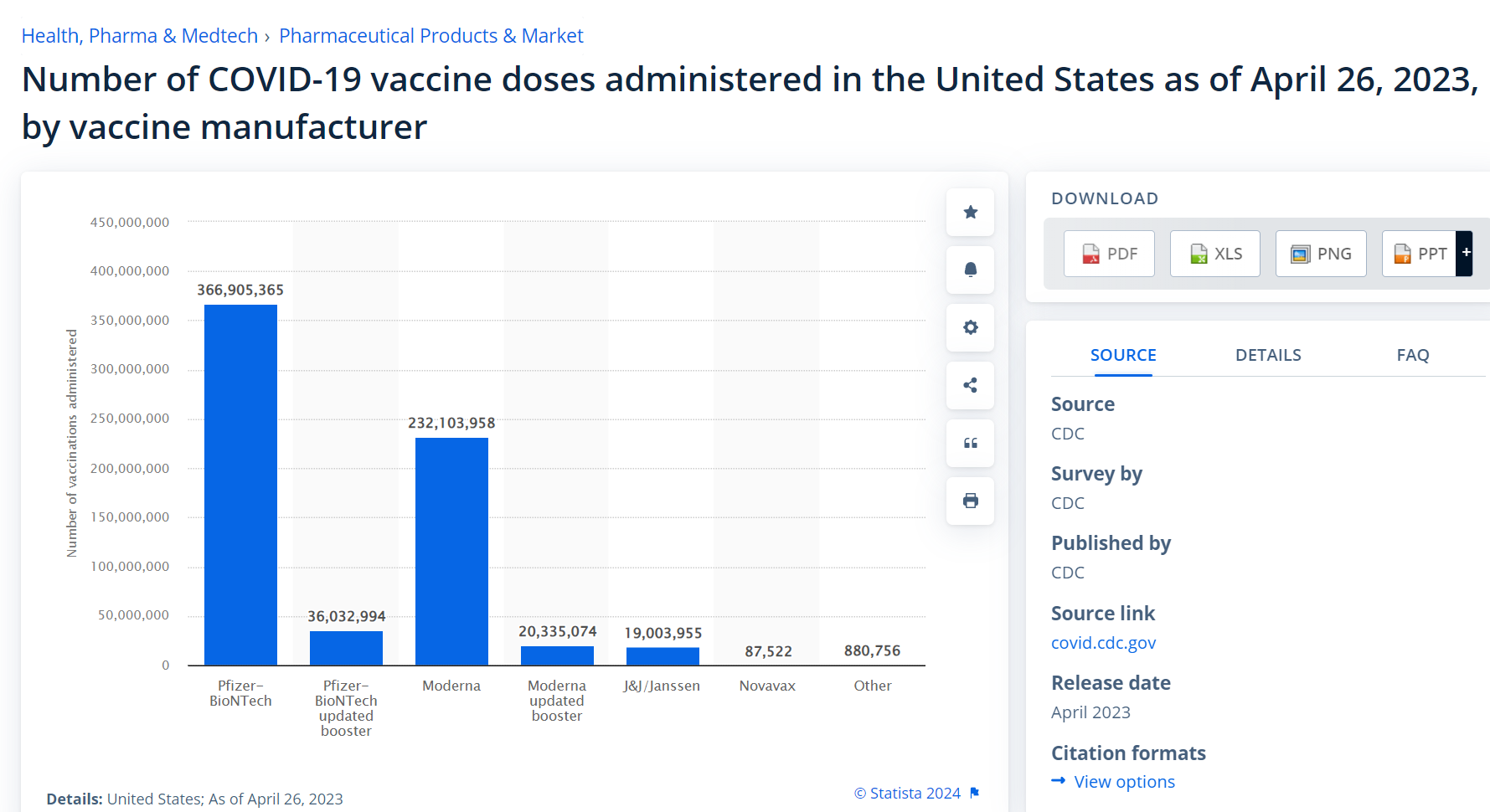
Here is the death count in VAERS for Moderna
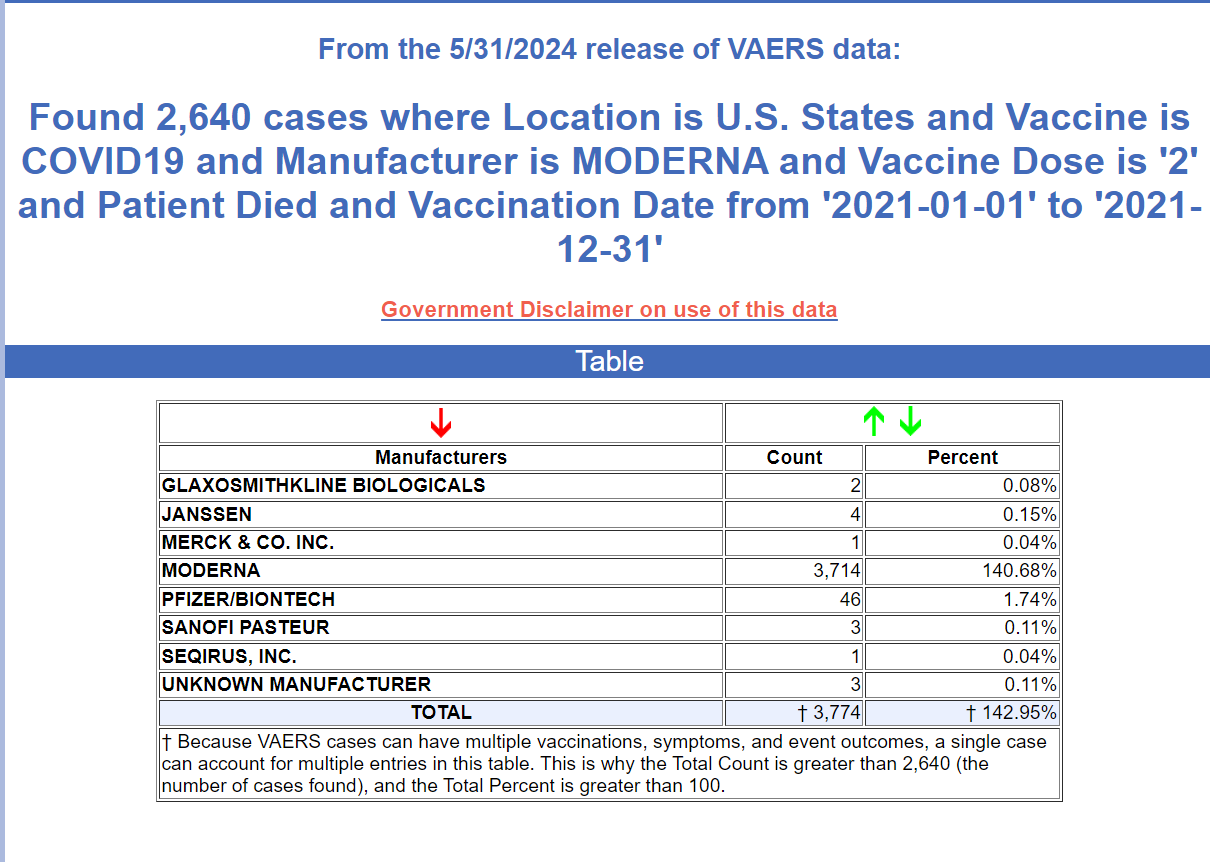
Here is the death count in VAERS for Pfizer
Pay attention only to the number after the “Found … cases where…” The counts have duplicates.
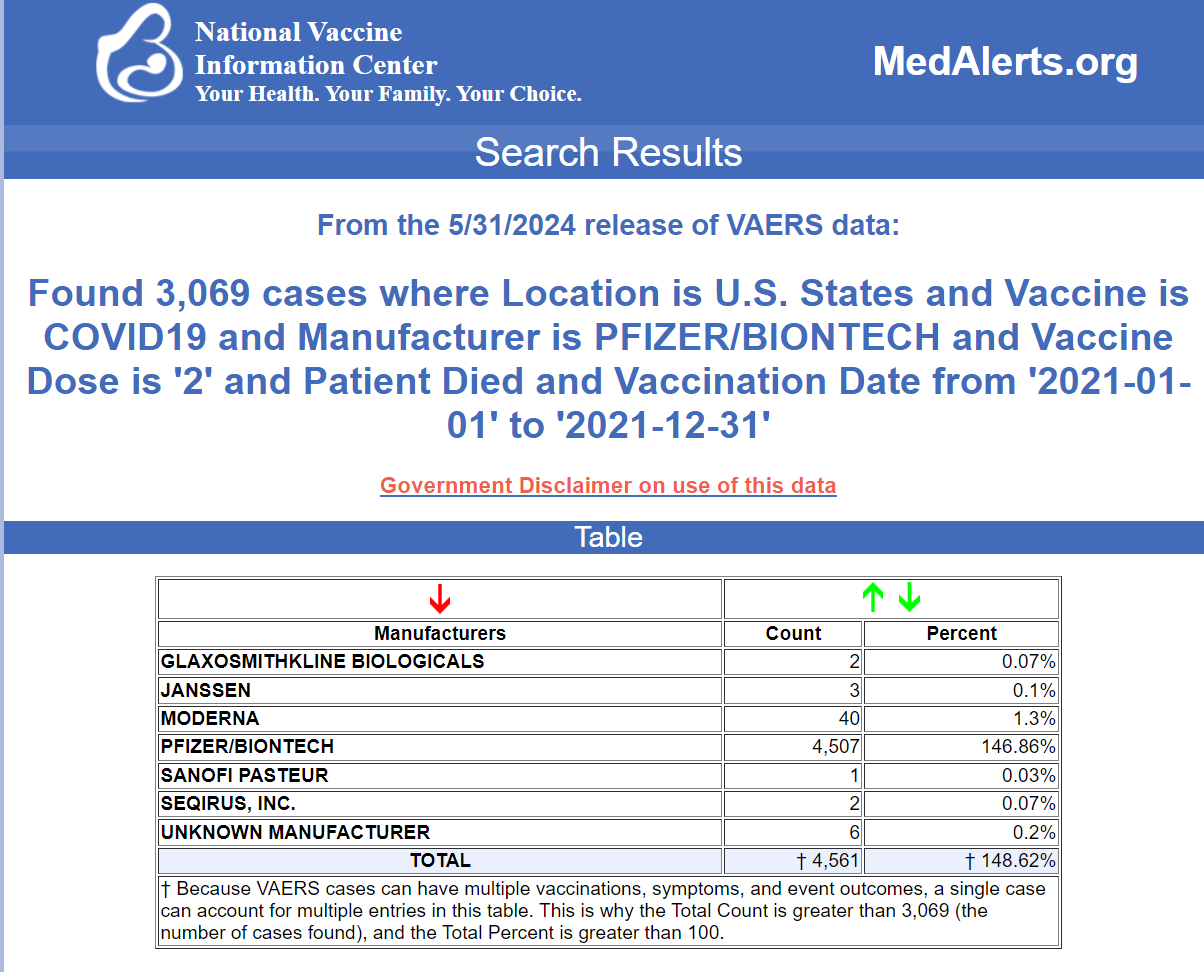
Here’s the math for the 30% increase in reported deaths from Moderna vs Pfizer per VAERS data
Python 3.11.2 (main, Mar 13 2023, 12:18:29) [GCC 12.2.0] on linux
Type "help", "copyright", "credits" or "license" for more information.
>>> mod_deaths=3714
>>> pfizer_death=4507
>>> pfizer_doses=366
>>> mod_doses=232
>>> pfizer_doses/mod_doses
1.5775862068965518
>>> pfizer_death/mod_deaths
1.2135164243403338
>>> 1.57/1.21
1.297520661157025
We know Pfizer isn’t safe either because 85% of all deaths in the ENTIRE HISTORY OF VAERS are from the COVID vaccines
It could be that the 30% ratio in VAERS is just excess deaths and if Pfizer increases ACM by .01% then a vaccine that increases ACM by .013% is no big deal.
But this just isn’t the case. Not even close. I’ve never in my life seen a vaccine that has created so many vaccine deaths and injuries. And most of them are from the Pfizer vaccine.
This is trivial to do in VAERS. Only one vaccine is unsafe. Can you spot it?
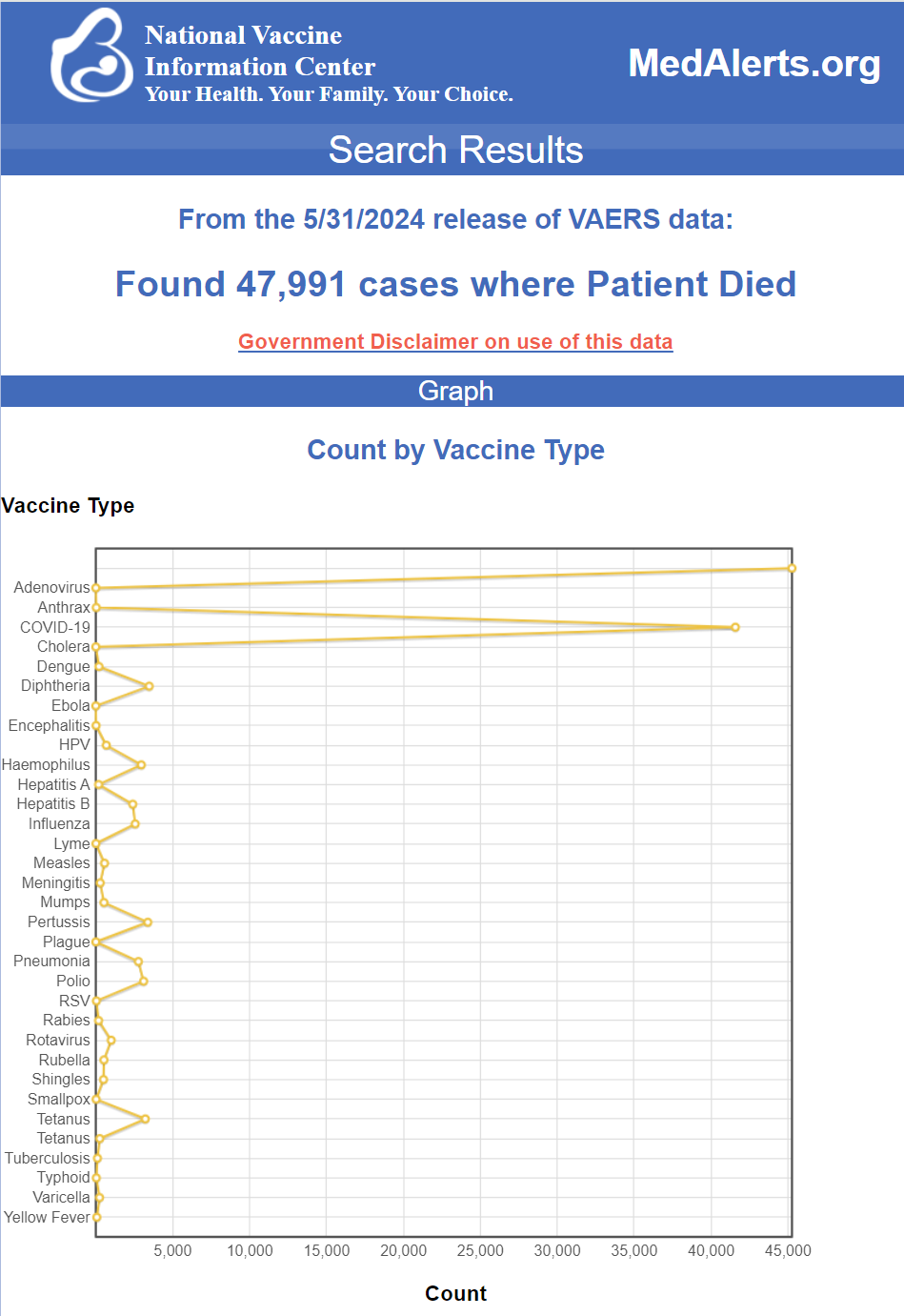
Other vaccines have far more doses than the COVID vaccines, but the COVID vaccines are the worst as far as reported deaths. How can they explain that?
And in the gold standard Pfizer clinical trial, the deaths in the vaccine group were at all times higher than the placebo group. If the vaccine was safe, this is highly unlikely… they would have switched positions randomly.
Why aren’t health authorities taking action? Because health authorities refuse to look at their own data AND the CDC refuses to request it from them!
On the VSRF call on July 11, 2024, we learned first hand that public health epidemiologists who blow whistles are rewarded by being fired and/or being faced with false criminal charges.
Any health authority who has record level data (which they all do AFAIK) could have done this analysis but they all choose to not look at their own data. They all assured us the vaccine was safe without examining their own data to back up their statements. They misled the public.
AFAIK, not a single health authority has looked at the ACM rates 1 year from the time of the shot of the different brands of vaccines. They all looked the other way and ignored their own data.
Have you ever seen a 1 year mortality comparison of vaccine brands published by a public health office? Of course not. They don’t look at their data.
Take Health New Zealand for example. When their DBA Barry Young pointed out that the data they collected showed the COVID vaccines were killing people (a fact easily evident from the time-series cohort analysis graphs showing an upward slope after the shot no matter what season it was given), they fired him and pressed criminal charges against him. To date, they have never produced an analysis of their data from the epidemiologists proving that Barry got it wrong. Why not?
The CDC is even worse… they didn’t even want to SEE the data and refuse to request it from the States. I know this because I had a face to face discussion with the head of media relations of the CDC Ben Haynes. I kept asking him why they didn’t request the data from the states and he said it is because Congress doesn’t give the CDC authority to request the data from the states. I said, “Have you tried asking nicely?” and he just repeated his previous statement.
Here’s an example. When I tried to get the Santa Clara County Public Health Department to explain why they said nothing when their own data showed that the COVID vaccines made things worse, they ignored me. When I had a County Supervisor ask, they told him “No comment.” When I escalated to the CEO’s office of Santa Clara County, they gave him the same “No comment” which my contact there said was a perfectly fine response to my query.
On June 30, 2024, a friend told me about this record level data legally from the Czech Republic government. It’s all the records for the entire country. It took me less than 2 days to analyze it and another week to make sure there were no flaws. And the results are devastating.
All the doctors who told you that the Moderna vaccine was safe misled you. And the media, lawmakers, public health officials, and US Presidents all told you this shit was safe without hard data showing it was safe. And they didn’t want to monitor the safety because they didn’t want egg on their face.
They all misled you.
The Czech gold-standard data shows there was no possible way these “vaccines” were ever safe. No confounders. No more doubt now.
Next steps: Write up for a peer-reviewed journal
I’ll be writing up the Czech data for publication in a peer-reviewed journal and will be revealing all the code to crunch the numbers and analyze the results this week.
What was amazing was how many people turned me down as a co-author on that paper saying it would ruin their career. What does that tell you?
So it’s not about telling people the truth; science today is about making sure you don’t tell the truth so you can keep your job.
They need to stop ignoring the data and take a stand
Everyone who has supported the “vaccine is safe” narrative should make a choice: either endorse what I’ve done or show how it is wrong and what the correct answer is.
Remember: the first rule of holes is when you find yourself in one, stop digging.
And the least they can all do is call for data transparency of public health data. The data released by the Czech Republic should be regularly released by every public health agency in the world instead of being kept hidden.
How does hiding the data save lives??
Summary
In this article, I showed that VAERS has been telling anyone who will listen that the Moderna shots are not safe.
In my next article, I will reveal the official government data from the Czech Republic that nobody wants to see. Why? Because it proves they were all wrong.
This is a train wreck.
The end is near.
And if you like my work and want to say “thanks” for the 1,500 Substack articles exposing the corruption over the past 3 years, please consider subscribing. I’d appreciate it as it allows me to afford to focus full time on exposing the truth. Thanks!!
|
1918 flu pandemic myth debunked by skeletal remains By Lisa Marshall • Published: Oct. 9, 2023 Look back at the chronicle of global pandemics, and the flu pandemic of 1918 stands out as an anomaly for one reason: According to the history books, it struck healthy adults in their prime just as often, if not more so, than the weak or sickly. This assumption has influenced research and literature for decades. But new research published Oct. 9 in the journal PNAS suggests it may not be true at all. In examining the skeletal remains of nearly 400 individuals, researchers from the University of Colorado Boulder and McMaster University found that in 1918 – just like in 2020 – people exposed to environmental, social or nutritional stressors before-hand were significantly more likely to succumb to a novel virus when it emerged. The findings shine a light on how modern-day communities could better prepare for pandemics and reveal potential shortfalls in relying exclusively on written texts to understand the past. “This idea that the 1918 flu killed healthy young people is not supported by our findings,” said co- author Sharon DeWitte, a professor of anthropology at CU Boulder who specializes in bioarchaeology — constructing the past via the study of human bones. “Instead, we found that this pandemic, like many others across history, disproportionately killed frail people.” Questioning folk wisdom with science In just two years, the flu pandemic of 1918 infected nearly one-third of the world’s population and killed more than 25 million people. Literature is filled with tragic references to it disproportionally striking the young and vibrant. “It seems to get the big, strong ones first,” lamented one character in Thomas Wolfe’s classic flu-era novel Look Homeward Angel. “The illness seemed to be as fatal to strong adults as to young children and to the old and debilitated,” reported a U.S. Naval Hospital doctor. Yet despite such anecdotes, the study authors could find no scientific data to support these claims. “It may be one of those ideas that begins as folk wisdom and gets reproduced in the literature over and over until it becomes canon,” DeWitte said. “We wanted to take a step back and ask: Do we really know what we think we know?” She notes that historical documents, while useful, tend to emphasize the fate of the privileged, while leaving out the perspectives of women, children and the disenfranchised. Skeletal remains can be gathered from a larger cross-section of society. And they reflect a lifetime of experiences, from traumatic injuries and diseases to nutritional deficits, which leave traces on teeth and bones. “What skeletal evidence can do is provide us with information about people who aren’t necessarily represented in those historical documents,” said DeWitte. “It can give us a window into their actual lived experiences.” Studying a pandemic during a pandemic DeWitte first got interested in bioarcheology at age 14 when she was diagnosed with scoliosis and underwent surgery. “I would fantasize about future archaeologists digging up my body and being able to spin a tale about my life based on the fact that I had this metal rod that did not decompose,” she recalls. She spent her early career in a cemetery in England, studying remains of those who had died of the bubonic plague, or Black Death, which killed a stunning 30 to 50% of the population in the 14th Century. Her work showed that the elderly and frail were most likely to succumb. For the new study, she and co-author Amanda Wissler, assistant professor of anthropology at McMaster University in Ontario, turned to the Hamann-Todd Human Osteological Collection. It includes more than 3,000 century-old human skeletons housed in the basement at the Cleveland Museum of Natural History. Wissler spent hours in that basement, as the COVID-19 pandemic wore on, poring over the bones of 369 individuals who died before or during a different pandemic a century earlier. The irony was not lost on her. “It’s very important to me to always remember that these were actual people,” said Wissler, who knew their names, ages and dates of death. “It can be intense work.” With magnifying glass in hand she tenderly looked over their shinbones in search of porous lesions – a lasting indicator of trauma, infection, stress or malnutrition. The most frail, based on their bone lesions, were 2.7 times more likely to have died during the flu epidemic, the study found. Wissler notes that because the flu epidemic of 1918 was so widespread it did, indeed, strike people in the prime of their lives sometimes, and those stories resonated, fueling the notion that it was a rare killer of the young. “When a 25-year-old dies you remember it more,” said Wissler. Their study, however, shows that even young victims tended have bones that hinted at prior health problems. “These findings suggest that there was some underlying source of frailty among the victims of the 1918 flu,” they write. The researchers suspect that, like with COVID and the Black Plague, socioeconomic status, education, access to healthcare, and institutional racism may have played a role. But further research is necessary. They caution that the sample size was small and the specimens were all from the Cleveland area so may not fully reflect national realities. But there are lessons to be learned from these bones, the authors said: There is danger in public health messaging that suggests everybody is equally likely to get sick. “What we have learned is that in future pandemics there will almost certainly be variation between individuals in the risk of death,” said DeWitte. “If we know what factors elevate that risk, we can expend resources to reduce them— and that’s better for the population in general.”
Nearly 1 In 3 COVID-19 Vaccine Recipients Suffered Neurological Side Effects: Study WEDNESDAY, NOV 01, 2023 - 04:20 PM Authored by Naveen Athrappully via The Epoch Times (emphasis ours), Almost a third of individuals who received a COVID-19 vaccine suffered from neurological complications including tremors, insomnia, and muscle spasms, according to a recent study published in the journal Vaccines. The study analyzed 19,096 people who received COVID-19 vaccines in Italy in July 2021, out of which 15,368 had taken the Pfizer vaccine, 2,077 had taken the Moderna version, and 1,651 took the AstraZeneca version. While both Pfizer and Moderna are mRNA vaccines, AstraZeneca, being an adenovirus vaccine, uses a different mechanism to trigger the immune response. The study found that about 31.2 percent of vaccinated individuals developed post-vaccination neurological complications, particularly among those injected with the AstraZeneca jab. Different vaccines had a different “neurological risk profile.” The neurological risk profile of the AstraZeneca vaccine included headaches, tremors, muscle spasms, insomnia, and tinnitus, while the risk profile of the Moderna vaccine included sleepiness, vertigo, diplopia (double vision), paresthesia (a feeling of numbness or itching on the skin), taste and smell alterations, and dysphonia (hoarseness or loss of normal voice). As to Pfizer vaccines, researchers found “an increased risk” of cognitive fog or difficulty in concentration. AstraZeneca Risks More than 53 percent of individuals who took an AstraZeneca shot suffered from headaches, which usually lasted for one day. Over 13 percent developed tremors, which typically reverted after a day as well. Insomnia was reported among 5.8 percent of AstraZeneca recipients. However, the study notes that researchers were unsure whether the individuals actually developed insomnia or had a “misperception of their sleep quality due to vaccination stress.” Tinnitus was reported by 2.7 percent of the people who took AstraZeneca shots. Tinnitus is a condition in which an individual hears ringing or other noises which are not caused by an external sound. All these health complications had a higher risk of occurring after taking the first dose of the vaccine. The study speculated that complications related to the AstraZeneca vaccine are attributable to two factors. “Firstly, the nature of the vaccine, which is a modified adenovirus vector that results in significant and persistent systemic immune activation; secondly, individual vulnerability related to a predisposing biology.” Moderna and Pfizer Risks Sleepiness was found in 39.7 percent of those who took Moderna jabs, with the condition usually lasting for a week. It suggested that there “could be a strict relationship between the development of sleepiness and immune responses to vaccine/infection.” The study cited a “fascinating hypothesis” which suggests that influenza vaccines may lead to “the selective immune-mediated destruction of orexin-producing neurons, which is T-cell-mediated neuronal damage, thus triggering narcolepsy.” Narcolepsy is a condition in which the brain is unable to control the ability to sleep or stay awake. “Considering that the same can occur for COVID-19 vaccines, future investigations monitoring the new-onset hypersomnia findings in vulnerable individuals are urgently needed.” Hypersomnia is the inability to stay awake and alert during the daytime, even though the person may have had plenty of sleep during the night. About 15.9 percent of people who received Moderna shots had vertigo, a sensation which makes the individual feel that they or their surrounding environment is moving or spinning. It typically lasted for a day. Paresthesia—a feeling of numbness or itching on the skin for no apparent reason—was reported in 14.5 percent of Moderna vaccine recipients, which went away after a day. Among the people who received a Moderna jab, 2.7 percent reported diplopia, also known as double vision, which also lasted for about a day. “Symptomatic people showed an increased risk to develop diplopia after the second dose, as if a reactivation of the immune response was necessary to trigger diplopia.” Meanwhile, about 6.4 percent of Pfizer vaccine recipients reported suffering from cognitive fog, with the condition usually reversing in a week. “Brain fog is a type of cognitive impairment that presents as a ‘foggy brain state’, including a lack of intellectual clarity, difficulty with concentration, mental fatigue and anxiety,” the study said. “Hypotheses including systemic inflammation crossing the blood–brain barrier, neuroinflammation after viral infection leads and microglial activation are emerging as explanations of this phenomenon in COVID-19 patients. An alternative speculation is that symptomatic people may have a subclinical cognitive dysfunction before vaccination, and that vaccination is a trigger.” Females Highly Affected The study found that females faced an “increased risk of developing neurological complications” following COVID-19 vaccination. “Our findings are in line with those of a recent study that revealed that several factors, including the female sex, were associated with greater odds of adverse effects,” it said. The researchers suggested that greater female susceptibility to the vaccines’ neurological complications may be due to “genetic and hormonal factors.” Females have two X chromosomes while males have one X chromosome and one Y chromosome. As the X chromosome “contains the most prominent immune-related genes in the human genome,” it can also cause “stronger inflammatory immune responses,” the study said. Moreover, a primary female sex steroid called estradiol triggers a specific immunity process to produce “antibodies against infections.” The study also raised concerns about comorbidities. In medical parlance, comorbidity describes the existence of more than one disease or condition in a body at the same time, which may or may not interact with one another. “The evidence that immune system dysfunctions (allergies/immunodeficiency disorders) are frequently reported in our symptomatic group is more than a chance occurrence,” researchers said. Comorbidities were present in 47.6 percent of the AstraZeneca vaccine recipients, 38.8 percent of those who took Moderna jabs, and 41.5 percent of individuals who received Pfizer shots, the study said. In the AstraZeneca group, both allergies and non-neurological diseases were reported. “A history of antitumoral and anticoagulant drugs was more frequent in this population,” the study said. Among Moderna and Pfizer recipients, allergies were “more frequently” observed. While some people who took Moderna had a prior history of neurological diseases and transfusions as well as previous COVID-19 infection, those who received Pfizer vaccines had a history of immunodeficiency disorders. Even though the study detailed neurological complications arising from COVID-19 vaccination, it admitted to certain limitations. “Firstly, our results should be interpreted with caution because of a possible overestimation of neurological events resulting from the self-reported symptoms,” it said. “Secondly, we evaluated the risks associated with the first and second doses of the vaccine; however, the data concerning the second dose were limited, thus representing a potential bias in the study.” While admitting its limitations, the study concluded that “clinicians should be aware that several neurological complications may commonly occur after COVID-19 vaccines.” “Caution should be used when administering COVID-19 vaccines to vulnerable people, such as to those who suffer from allergies,” the study stated. “We strongly believe that our findings are relevant for public health regarding the safety of vaccines in a large cohort.” The Epoch Times reached out to Moderna, Pfizer, and AstraZeneca for comment. Additional Neurological Findings Cardiologist Dr. Peter McCullough wrote about the study discussing neurological effects following COVID shots in an article on Substack. “A shocking 31.2 percent of respondents to this large dataset sustained neurologic injury after two injections with verified data in health registries,” he wrote. “Most of the risk estimates indicate the safety profile is unacceptable. It is alarming that all neurological societies to date still recommend COVID-19 vaccines and none have issued safety warnings on the products.” Dr. McCullough explained that an excess risk of 20 percent or greater is considered "clinically important." Multiple other studies have found evidence of COVID-19 vaccines being linked to neurological complications. Back in October 2021, a study published in the Neurological Sciences journal stated that the “most devastating neurological post-vaccination complication is cerebral venous sinus thrombosis (CVST).” CVST occurs when a blood clot develops in the venous sinuses of the brain. This blocks the blood from draining out of the brain, eventually resulting in the blood leaking into brain tissues and forming a hemorrhage, according to Johns Hopkins Medicine. The study found that CVST was “frequently reported in females of childbearing age,” generally among those who took an adenovector vaccine. Individuals who received mRNA vaccination were reported to have Bell’s palsy, in which facial muscles weaken or enter into paralysis. A November 2022 study in Current Neurology and Neuroscience Reports made similar findings, stating that there is “a greater than expected occurrence of severe neurological adverse events." Dr. McCullough cited this study in an article the following month. “Because the vaccines contain lipid nanoparticles loaded with genetic material that code for the damaging Spike protein, each patient faces a Russian Roulette of whether or not the nervous system will be hemodynamically showered with the damaging vaccine particles,” he wrote. Despite studies suggesting the risk of medical complications, some experts continue to advise people to get COVID-19 jabs. According to John Hopkins Medicine, both Pfizer and Moderna are “highly effective in preventing serious disease, hospitalization, and death from COVID-19.” [I wonder how many millions have been contributed to JHU by vaccine makers? Obviously enough to get them to engage in medical malpractice.—TR] It recommended people to get a COVID-19 shot as “we believe that their benefits outweigh their risks," Johns Hopkins Medicine said. According to a position statement from the American Academy of Neurology (AAN) issued in 2021, the organization recommended COVID-19 vaccine mandates for health care employees and supported vaccinations for children under the age of 12. Shocking data from Israel's largest healthcare organization shows a staggering increase in cardiac arrest diagnoses.and number of people dying post vaccination.We now have some new diagnosis data from Israel, which was acquired through a Freedom of Information Act (FOIA) request made by attorney Ori Shabi on May 30th, 2023. Firstly, we can observe that Cardiac Arrest diagnoses nearly doubled from 2020 to 2021 and more than doubled from 2021 to 2022. This is an extremely concerning trend as it is showing acceleration. 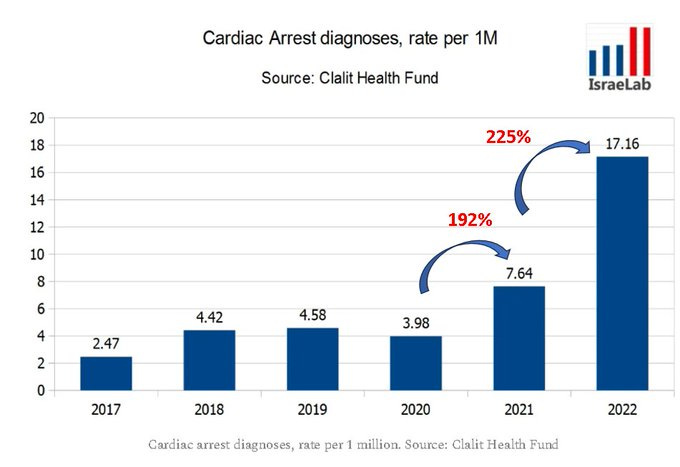 In 2020, there was 1 cardiac arrest per 251,256 population. In 2021, there was 1 cardiac arrest per 130,890 population. In 2022, there was 1 cardiac arrest per 58,275 population. If this trend continues at approximately 200%, we will see Of course, we hope that with fewer people vaccinating now, the trend may reverse. For clarification, the annual incidence of out-of-hospital cardiac arrest in Israel varies between 20 and 140 per 100,000 people [SOURCE]. It is important to note that there can be significant discrepancies between population data and health insurance data for several reasons, such as insurance data only including individuals with health insurance coverage. Additionally, variations in definitions (e.g., out-of-hospital cardiac arrests vs. hospital cardiac arrests) can contribute to these discrepancies. Instead of solely analyzing the numbers, it is more meaningful to examine the trends over time. This approach allows for a better understanding of the patterns and changes in cardiac arrest incidence in Israel. Let’s look at trends on the number of death. The number of deaths due to cardiac arrest and stroke is also increasing at an accelerated rate between 2020 and 2022. Prior to 2020, the number of deaths in these categories was virtually zero. 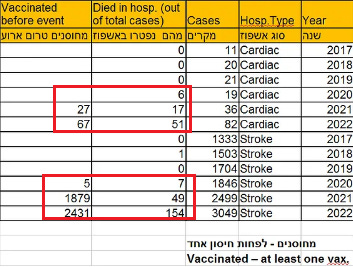 Israel is one of the most highly vaccinated countries in the world, with 81.5% of its population having received at least one dose. However, in 2023, it appears that a majority of the population has become anti-vaxxers. It is unfortunate that despite the decrease in experimental vaccinations by the people, deaths and cases continue to accelerate. 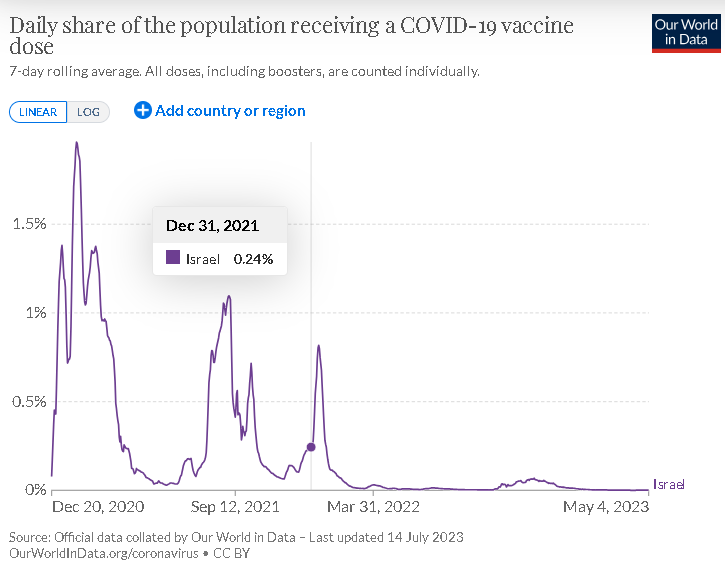 My strongest suspicion at the moment is that the cardiac arrests are caused by subclinical myocarditis due to vaccinations instead of COVID infections. In a large population-based study conducted last year on Clalit Health Services members in Israel, it was found that there was no increased incidence of either pericarditis or myocarditis in adult patients recovering from COVID-19 infection. [SOURCE] 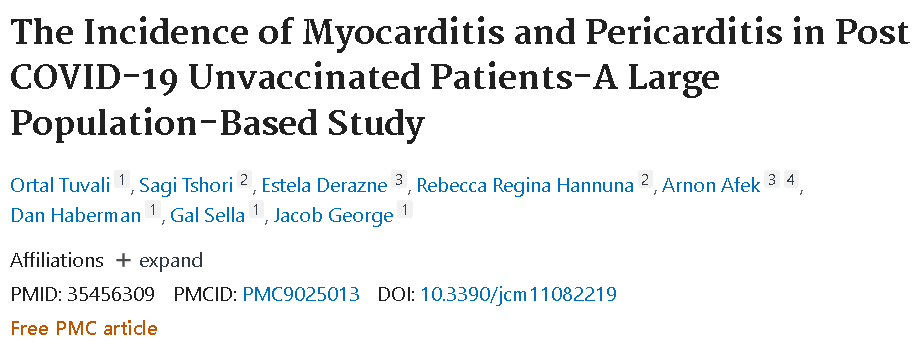 In another study published in Nature, it was found that there was an increase in emergency cardiovascular events among the under-40 population in Israel during the vaccine rollout and the third wave of COVID-19. [SOURCE]  (H/T to Rebekah Barnett for sharing these studies. Please visit her Substack here.)
Delay of Pfizer and Moderna’s Subclinical Myocarditis StudyUnfortunately, for reasons unknown, the FDA has not released the data regarding Pfizer's substudy to assess the incidence of subclinical myocarditis after the third dose, which was scheduled for December 2022.  As of June 2023, Moderna's similar study is also overdue, and we have not received any updates from the FDA. If the data were positive, I believe they would have released it promptly. However, it seems that they may need more time to review and “massage” the data before making an announcement. 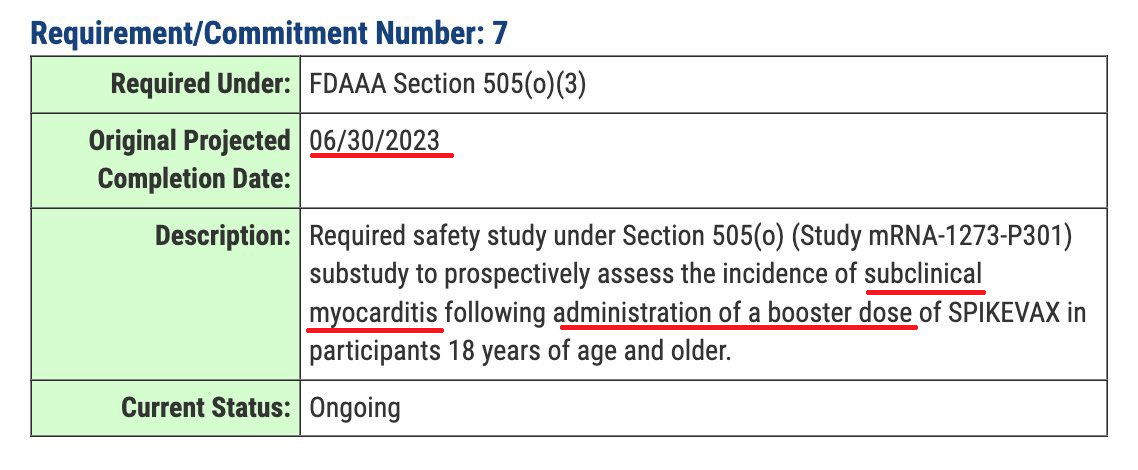 Anyway, for further commentary and context on Israel's data, please visit IsraeLab's Substack.
Oxford Professor: Official Data Shows Face Masks "Made No Meaningful Difference" to Infection Rates--MUST READ |
| From: |
Oxford Professor: Official Data Shows Face Masks “Made No Meaningful Difference” to Infection Rates
Face coverings “unlikely to have much of an impact” in fighting Omicron.
30 November, 2021
University of Oxford Professor Jim Naismith asserts that despite England dropping its mask mandate in July and Scotland keeping its rules in force, official data shows this “has made no meaningful difference” to infection rates.
Naismith goes on to argue that new face mask mandates imposed in England today are “unlikely to have much of an impact” in fighting off the spread of the Omicron variant.
Despite flatlining case numbers and declining deaths, partly achieved because England chose to lift lockdown restrictions in the summer unlike many European countries, mask mandates are once again back in force.
Face coverings are compulsory in shops, on public transport and numerous other venues arbitrarily chosen by the government.
Highlighting the absurdity of the rules, face masks are mandatory in takeaways but not restaurants, meaning you have to wear one if picking up a takeaway but not if you stay inside the restaurant for a sit down meal.
According to Naismith, Director of the Rosalind Franklin Institute and Professor of Structural Biology at the University of Oxford, masks are largely pointless.
“The ONS survey results on prevalence shows that the Scottish and English approach to masking, although formally different since July, has made no meaningful difference to Delta,” writes Naismith.
“In both countries very high levels of prevalence have continued for months. Thus the new changes announced are unlikely to have much of an impact if Omicron does indeed spread rapidly,” he added.
As the graph above illustrates, despite England dropping mask mandates and Scotland keeping them in place after July, infection rates were similar or indeed higher in Scotland.
ONS graphs also validate such assertions.
“You can see the ONS graphs below for yourself, and he’s right,” notes Will Jones. “Yet the Government has re-imposed masks in schools, shops and on public transport, despite there being no evidence that they make any significant impact on the spread of disease.”
A comparison between case rates in Sweden (which never legally imposed face masks) and the rest of Europe is also very revealing.
Naismith’s verdict on face masks is backed up by UK government SAGE adviser Dr Colin Axon, who dismissed masks as “comfort blankets” that do virtually nothing, noting that the COVID-19 virus particle is up to 5,000 times smaller than the holes in the mask.
“The small sizes are not easily understood but an imperfect analogy would be to imagine marbles fired at builders’ scaffolding, some might hit a pole and rebound, but obviously most will fly through,” Axon said.
As the video below illustrates, public health officials like Dr. Hillary Jones (and even Dr. Fauci himself) originally were correct in saying that face masks were pointless.
However, as soon as they ‘got the memo’ that face masks were a tool of population control to keep people scared and compliant, their rhetoric on face coverings did a complete 180.
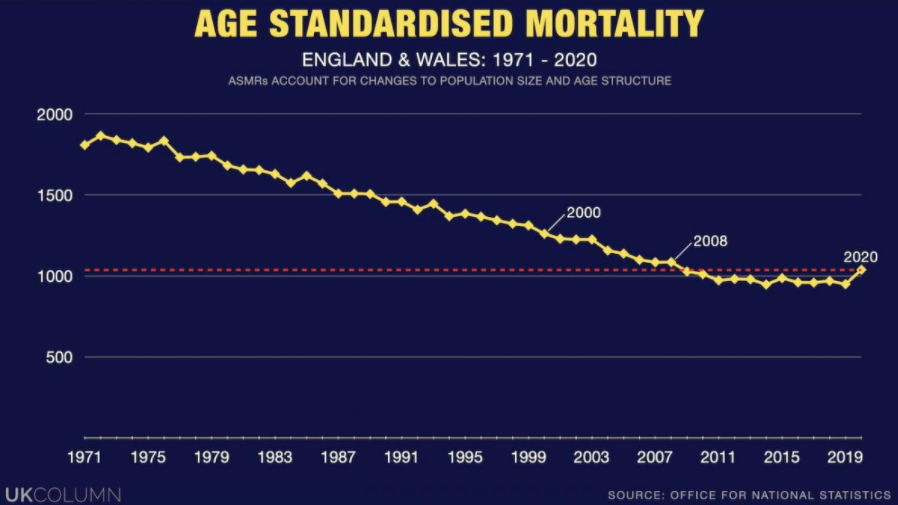
30 facts you NEED to know: Your Covid Cribsheet

